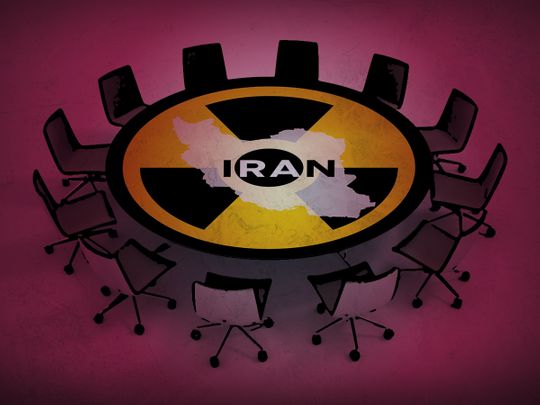
As French President Emmanuel Macron works the phone to shore up support for a revived nuclear deal with Iran, on behalf of his five plus one counterparts, the recently reported draft of the deal that is being negotiated in Vienna seems to miss an important factor — Tehran’s belligerent policies in the Middle East.
Macron spoke with his Iranian counterpart Ebrahim Raisi on Saturday, “urging him to agree” to a deal to revive a 2015 nuclear agreement, the French presidency said in a statement. The call, which reportedly lasted 90 minutes, came few hours after Macron’s foreign minister, Jean-Yves Le Drian, told the media that “Iran has reached a moment of truth and must decide in days, not weeks, whether to accept the text of a nuclear deal accepted by China, Russia, European powers and the United States.”
The French seem eager to clinch a deal in the midst of the Ukrainian standoff, one of Europe’s most dangerous crises since the Second World War. Paris thinks that the Vienna negotiations, going on for months, could falter as the US gets distracted by the Covid-19 pandemic, historically high rate of inflation, and the standoff on the Ukrainian border.
Reuters last week reported what it said was a draft of the revived 2015 deal. The details show emphasis on lifting US sanctions on Iran, unfreezing some of Tehran’s assets and the usual restrictions on its nuclear programme. A prisoner swap was also on the table, according to a speech at the weekend’s Munich Security conference by Iranian Foreign Minister Hossein Amirabdollahian. A European diplomat, at the conference, was quoted by agencies as saying he expected “an agreement in the coming week, the coming two weeks or so.”
That is good news. Bringing Iran from the cold in the hope that its theocratic regime would finally abide by international norms is worth the try. But what about Tehran’s actions that continue to destabilise the region and instigate conflicts by its financial, political and military support to proxy militias in more than one Arab country in addition to its interference in the internal affairs on its Arab neighbours?
The recent attacks by Al Houthi terror groups, foiled by the UAE and Saudi Arabia, highlight the impact of Iran’s behaviour. The US administration has for long maintained that Iran’s regional policies and its ballistic missile programme would have to be part of the Vienna talks.
Now, as France’ Le Drian said, is the moment of truth — for the US though. Washington must insist on the inclusion of those fundamental issues in the revived deal. The Iran deal is said to be important to maintain global peace. And so is the security of the Middle East.





